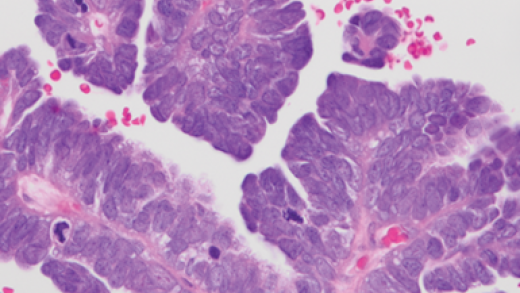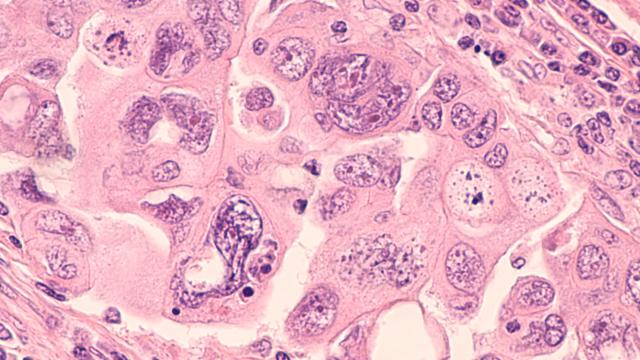Jung-Min Lee, M.D.
- Center for Cancer Research
- National Cancer Institute
- Building 10, Room 6B12
- Bethesda, MD 20892-1361
- 240-760-6128
- leej6@mail.nih.gov
RESEARCH SUMMARY
Dr. Lee’s research focuses on developing targeted therapies for ovarian carcinoma. Her studies have identified key proteins of DNA damage response pathways as therapeutic targets, opening up possibilities for novel therapies for this disease. Her research also emphasizes the collection of patient samples to better understand treatment response and tumor biology in gynecologic malignancies. Dr. Lee is the Principal Investigator of multiple investigator-initiated clinical trials and the Study Chair of multi-center Phase II/III clinical trials.
Areas of Expertise
Information for Patients
Learn more about our clinical trials and the highly specialized care teams that lead them.
Jung-Min Lee, M.D.
Clinical Trials
Research
Dr. Lee’s group investigates the therapeutic potential of targeting key proteins of DNA damage response and replication stress in ovarian cancer.
Project 1. Replication stress as a novel therapeutic strategy.
Cell cycle checkpoints such as ATR and CHK1 are the major regulators of DNA replication and DNA damage repair. ATR and CHK1 function as primary mediators of G2/M cell cycle arrest in tumors with p53 mutation and associated G1/S cell cycle dysregulation, such as high-grade serous ovarian cancer (HGSOC). Dr. Lee demonstrated augmenting replication stress by modulating ATR/CHK1 pathway would induce DNA damage and cell death in various HGSOC preclinical models. Dr. Lee’s group studies clinical and translational aspects of modulating these proteins and their interactions with other pathways in HGSOC to develop novel clinical trials.
Project 1a. Clinical and translational investigation of ATR/CHK1 pathway blockade in HGSOC.
Dr. Lee demonstrated the early clinical activity of CHK1 inhibitor (CHK1i) in heavily pretreated HGSOC patients. Her work led to the development of registration intent multi-center phase II trial of CHKli ACR-368 for women with platinum-resistant ovarian cancer (GOG-3082). Dr. Lee also has begun to investigate the ATR/CHK1 pathway inhibition in PARP inhibitor (PARPi)-resistant HGSOC and designed new clinical trials of ATR/CHK1 pathway blockade-based combinations for PARPi-resistant HGSOC. These studies incorporate the collection of patient tissue and blood samples to understand the biology and resistance to the drugs, and to develop the next generation of clinical trials.
Project 1b. Characterization of resistance to DNA repair inhibitors.
Dr. Lee’s laboratory has begun to characterize ATR/CHK1 pathway blockade resistant HGSOC using preclinical models and clinical samples. Her laboratory also identified unique mechanisms of PARPi-resistance in HGSOC cell lines based on the treatment dosing and schedules which provide invaluable resources for the development of novel clinical trials and translational studies. Dr. Lee proposes that high levels of replication stress define a subgroup of PARPi-resistant HGSOC susceptible to therapeutic targeting of this pathway. Ongoing work is focused on mechanical investigation of replication stress response and resistance to the drugs, and its biological relevance in ovarian cancer.
Project 2. Clinical and translational investigation of PARPi-based combinations in HGSOC.
Data suggest that inhibition of DNA repair and angiogenesis pathways modulate the immune response by increasing DNA damage and attenuating the immunosuppressive microenvironment. Dr. Lee’s work is the first demonstration of safety and early activity of PD-L1 blockade with a PARPi, olaparib, and/or a VEGFR inhibitor, cediranib. Using fresh tissue and blood samples, her correlative studies identified that upregulation of VEGF signaling was associated with a lack of response to PD-L1 inhibitor and PARPi combination, indicating the importance of blocking VEGF/VEFGR signaling in ovarian cancer. After successful completion of phase I/II single-center study, three-drug, durvalumab in combination with olaparib and cediranib, is currently being investigated in the multi-center phase II trial (NRG-GY023) for platinum-resistant ovarian cancer.
Publications
- Bibliography Link
- View Dr. Lee's Complete Bibliography at NCBI.
Cediranib and Olaparib Combination Compared With Cediranib or Olaparib Alone, or Chemotherapy in Platinum-Resistant or Primary Platinum-Refractory Ovarian Cancer: NRG-GY005
Biography
Jung-Min Lee, M.D.
Dr. Lee is a board-certified medical oncologist, an NIH Lasker Clinical Research Scholar, and an elected member of the American Society for Clinical Investigaton. She is a graduate of Yonsei University, Wonju College of Medicine in South Korea. She completed residency training in internal medicine at the Albert Einstein Medical College, followed by a clinical research fellowship on breast cancer functional imaging at the Memorial Sloan-Kettering Cancer Center in New York. Dr. Lee came to NCI for medical oncology training in the Medical Oncology Branch (MOB)/CCR/NCI. After completing a fellowship, she established her own clinical and translational program which studies the therapeutic potential of DNA damage response pathways and cell biology of ovarian cancer. She became an NIH Lasker Clinical Research Scholar in 2016 and was awarded tenure from NIH in 2024. Her work has been recognized by the inaugural Jane C. Wright MD ASCO Young Investigator Award, Ovarian Cancer Research Award by the Foundation for Women's Cancer, NCI/CTEP Career Development Letter of Intent (CrDL) Award, Exceptional Mentor Award by NCI Office of Work Planning and Development, NCI Director's Award for Clinical Science and Federal Technology Transfer Award. Dr. Lee maintains her research focuses on the scientifically driven clinical trials and translational studies of ovarian cancer and other gynecologic malignancies. She now leads multiple clinical trials through Center for Cancer Research/NCI, GOG foundation, and NRG Oncology.
Job Vacancies
We have no open positions in our group at this time, please check back later.
To see all available positions at CCR, take a look at our Careers page. You can also subscribe to receive CCR's latest job and training opportunities in your inbox.
Team
News
Lab Life
Jayakumar Nair, Ph.D., Elena Giudice, M.D., Tzu-Ting Huang, Ph.D., Chi-Ting Shih, Ph.D., Jung-Min Lee, M.D.


